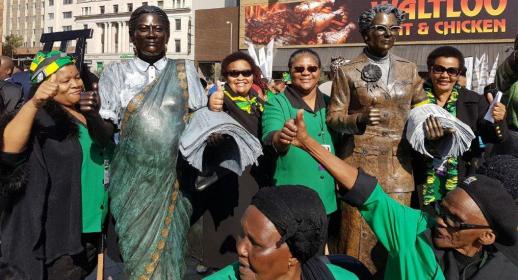 Every year on 9 August we celebrate Women’s Day in South Africa, a public holiday that pays homage to the women of our nation; - the mothers, the wives, the sisters, the daughters, the aunts and grandmothers who fought tirelessly against the tyranny of the Apartheid government. This year marks the 60th anniversary of the defiant march of 20 000 women to the Union Building in Pretoria. Women’s day is celebrated on the 9th August every year, with the main purpose to uplift and prosper women of our nation. An inspiring display of political strength, female solidarity and inner fortitude, the march on August 9 1956 is both a reminder of the great women who helped mould South Africa and the trailblazing women who continue to lead the country forward
Every year on 9 August we celebrate Women’s Day in South Africa, a public holiday that pays homage to the women of our nation; - the mothers, the wives, the sisters, the daughters, the aunts and grandmothers who fought tirelessly against the tyranny of the Apartheid government. This year marks the 60th anniversary of the defiant march of 20 000 women to the Union Building in Pretoria. Women’s day is celebrated on the 9th August every year, with the main purpose to uplift and prosper women of our nation. An inspiring display of political strength, female solidarity and inner fortitude, the march on August 9 1956 is both a reminder of the great women who helped mould South Africa and the trailblazing women who continue to lead the country forward
Inaugurated in 1994, along with a free, democratic South Africa, the public holiday commemorates a 1956 protest lead by Lilian Ngoyi, Helen Joseph, Albertina Sisulu and Sophia Williams-De Bruyn. To rise up against the legislation that required black South Africans to carry the "pass" (special identification documents which infringed on their freedom of movement during the Apartheid era), approximately 20 000 women from all over the country took to the streets of Pretoria – many carrying the children of their white bosses on their backs – to stage a peaceful march to the Union Buildings.
Women have come to create so much ideology in the 21st century that it would be impossible to establish a society without the aid of women, they bring great joy, a sense of belonging and stability to our lives. They have the ability to transition and transform into fitting times, words and their physical- beings allows for guidance, knowledge, wisdom, emotions, encouragement and motivation. Modern time’s is what they live for. Great focus was placed on women to attain education, to enrich and strengthen as well as broaden their mindset to be able to balance daily battles and challenges in life, to equalize them with men and provide the same opportunities as male counterparts and occupy a role in the workplace. Women signify so much more than their physical-beings, they are intrinsically good and beneficial to our society.
Immense success was brought along with women in their fight of breaking the chains of apartheid, racism, sexism, education and inequality to mention a few. Many more changes is needed and in due time all will take place creating a conducive environment for all not just woman. -’You struck a woman, you struck a rock ‘-Long live woman of this land!



